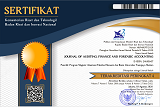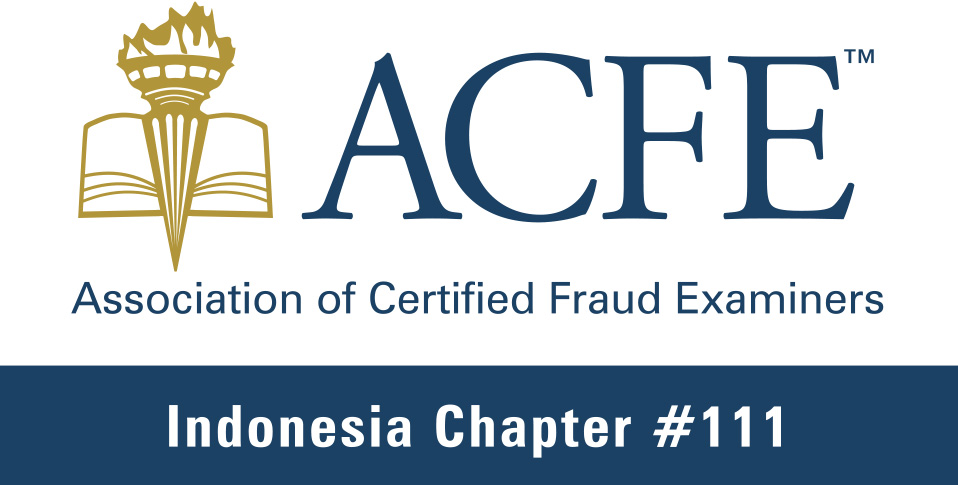THE FACTORS AFFECTING TENDENCY OF FRAUD IN GOVERNMENT SECTOR
Abstract
The purpose of this study is to explore perception of government officials in government agencies about the effects of morality of individuals, organizational culture, and leadership style on tendency of fraud. This study is a quantitative research using a survey which collected main data from the samples by using questionnaire. This research was analyzed with Multiple Linear Regression Analysis. The respondents of this research were the Subsection Head of Finance and Expenditure Treasurer. The findings indicate that morality of individuals has no significant effect on tendency of fraud, while organizational culture and leadership style have a significant negative effect on tendency of fraud.
Tujuan penelitian ini adalah untuk menggali persepsi para pegawai pemerintah di instansi pemerintahan mengenai pengaruh moralitas individu, budaya organisasi, dan gaya kepemimpinan terhadap kecenderungan fraud. Penelitian ini menggunakan metode kuantitatif dengan cara survei yakni mengumpulkan data pokok dari suatu sampel dengan memakai instrumen kuesioner. Penelitian ini dianalisis dengan menggunakan Analisis Regresi Linier Berganda. Responden penelitian adalah kepada Kasubbag Keuangan dan Bendahara Pengeluaran. Hasil penelitian menunjukkan bahwa moralitas individu tidak berpengaruh signifikan terhadap kecenderungan fraud, sedangkan budaya organisasi dan gaya kepemimpinan berpengaruh negatif signifikan terhadap kecenderungan fraud.
Keywords
Full Text:
PDFReferences
Akindele, R. 2011. Fraud as a negative catalyst in the Nigerian banking industry. Journal of Emerging Trends in Economics and Management Sciences 2 (5). Pp. 357-363.
Ali, A. J. 2009. Islamic perspectives on leadership: a model. International Journal of Islamic and Middle Eastern Finance and Management 2 (2). Pp. 160-180.
Aliyudin, R. S. 2015. The influence of Morality of Individuals and the Internal Control on the Tendency of Accounting Fraud. Thesis of Postgraduate Program Accounting at Universitas Widyatama.
Association of Certified Fraud Examiners (ACFE). 2014.Report to the Nations on Occupational Fraud and Abuse
Campbell, J.-L., and A. S. Göritz. 2014. Culture corrupts! A qualitative study of organizational culture in corrupt organizations. Journal of business ethics 120 (3). Pp. 291-311.
Chan, S. H. 2010. The influence of leadership expertise and experience on organizational performance: a study of Amanah Ikhtiar Malaysia. Asia Pacific business review 16 (1-2). Pp. 59-77.
Creemers, B. P. M. and Reynolds, D. 1993. in press). Development of a Middle Range Theory for Educational Effectiveness.
Creswell, John W. 2014. Research Design. The approach of Qualitative, Quantitative, and Mixed. Third Edition. Publisher Pustaka Pelajar. Yogyakarta.
Denison, D. R., and G. M. Spreitzer. 1991. Organizational culture and organizational development: A competing values approach. Research in organizational change and development 5 (1):1-21.
Dewi, G. A. K. R. S. 2014. Pengaruh Moralitas Individu Dan Pengendalian Internal Pada Kecurangan Akuntansi.
Fagbohungbe, B. O., G. A. Akinbode, and F. Ayodeji. 2012. Gender and organizational factors as determinants of workplace Fraudulent behaviours in Nigeria: an empirical analysis. International Journal of Business Trends and Technology 2 (2). Pp. 11-21.
Fiedler, F. E. 1967 A Theory of Leadership Effectiveness, New York: McGraw-Hill.
Firdaus, E. F., and E. Suryandari. 2016. Pengaruh Faktor Kultur Organisasi, Manajemen, Strategi, Keuangan, Auditor dan Pemerintahan Terhadap Kecenderungan Kecurangan Akuntansi. Jurnal Akuntansi dan Investasi 9 (2):173-188.
Fontes, A. 2015. Kecenderungan Korupsi: Suatu Pengujian Aspek Keperilakuan: studi Pada Kantor Kementerian Pekerjaan Umum Timor Leste, Magister Akuntansi Program Pascasarjana UKSW.
Frankena, W. K. 1966. The concept of morality. The Journal of Philosophy 63 (21). Pp. 688-696.
Gibson, James L. et al. 1996. Organisasi: Perilaku, Struktur, Proses. Translated by Ninuk Adriani. Jakarta: Binarupa Aksara.
Graham, K. A., J. C. Ziegert, and J. Capitano. 2015. The effect of leadership style, framing, and promotion regulatory focus on unethical pro-organizational behavior. Journal of business ethics 126 (3). Pp. 423-436.
Guttentag, M. D., C. L. Porath, and S. N. Fraidin. 2008. Brandeis' policeman: Results from a laboratory experiment on how to prevent corporate Fraud. Journal of Empirical Legal Studies 5 (2). Pp. 239-273.
Haberman, Michael D. 2014. Morality and Ethics in The Workplace. eSkill Blog. Online Skills Assessment.
Indriani, I., A. Suroso, and S. Maghfiroh. 2016. Penerapan Konsep Fraud Diamond Theory dalam Mendeteksi Perilaku Fraud. Simposium Nasional Akuntansi XIX, Lampung,.
Jo Hatch, M., and M. Schultz. 1997. Relations between organizational culture, identity and image. European Journal of marketing 31 (5/6). Pp. 356-365.
Kreitner, R., and A. Kinicki. 1992. Organizational Behavior: Irwin.
Nisak, Chairun; Prasetyono; and Fitri Ahmad Kurniawan. 2013. Sistem Pengendalian Intern Dalam Pencegahan Fraud Pada Satuan Kerja Perangkat Daerah (SKPD) Pada Kabupaten Bangkalan. Journal ofAuditing, Financed and Forensic Accounting. Vol. 01 No. 1 April 2013 Hal. 15 - 22
Ogbonna, E., and L. C. Harris. 2000. Leadership style, organizational culture and performance: empirical evidence from UK companies. International Journal of Human Resource Management 11 (4). Pp. 766-788.
Ostas, D. T. 2007. When Fraud Pays: Executive Self‐Dealing and the Failure of Self‐Restraint. American Business Law Journal 44 (4). Pp. 571-601.
Pramudita, A. 2013. Analisis Fraud di Sektor Pemerintahan Kota Salatiga. Accounting Analysis Journal 2 (1).
Puspasari, N., and E. Suwardi. 2016. The Effect of Individual Morality and Internal Control on The Propensity to Commit Fraud: Evidence From Local Governments. Journal of Indonesian Economy and Business 31 (2).
Rest, J. R. 1994. Moral development in the professions: Psychology and applied ethics: Psychology Press.
Robbins, S. P. 1993. Organizational Behavior: Concepts, Controversies, and Applications. Sixth Edition. Prentice Hall, Englewood Cliffs, New Jersey.
Rusdi, D., and Z. Kumalasari. 2015. Factors Influencing Trends on Fraud (Fraud): Employee Perceptions of District Kendal. International Foundation for Research and Development (IFRD):134.
Salahuddin, M. M. 2010. Generational differences impact on leadership style and organizational success. Journal of Diversity Management, 5 (2):1.
Schein, E. H. 1983. The role of the founder in creating organizational culture. Organizational dynamics 12 (1). Pp. 13 to 28.
Sims, R. R., and J. Brinkman. 2002. Leaders as moral role models: The case of John Gutfreund at Salomon Brothers. Journal of business ethics 35 (4). Pp. 327-339.
Soselisa, R., and Mukhlasin. 2008. Pengaruh Faktor Kultur Organisasi, Manajemen, Strategik, Keuangan, Dan Auditor Terhadap Kecenderungan Kecurangan Akuntansi: Studi Pada Perusahaan Publik Di Indonesia. Simposium Nasional Akuntansi XI 2:1-23.
Sugiyono. 2013. Metode Penelitian Pendidikan (Pendekatan Kuantitatif, Kualitatif, dan R&D). Bandung: Alfabeta.
Sugiyono. 2013. Statistika Untuk Penelitian. Bandung: Alfabeta.
Tierney, W. G. 1988. Organizational culture in higher education: Defining the essentials. The Journal of Higher Education 59 (1):2-21.
Transparency International Indonesia. 2015. Corruption Perceptions Index.
Tuanakotta, Theodorus. M. 2014. Akuntansi Forensik dan Auditor Investigatif. Publisher Salemba Four. Jakarta.
Turner, J. R., and R. Müller. 2005. The project manager's leadership style as a success factor on projects: A literature review.
Uddin, N., and P. R. Gillett. 2002. The effects of moral reasoning and self-monitoring on CFO intentions to report Fraudulently on financial statements. Journal of business ethics 40 (1). Pp. 15-32.
Wahjosumidjo. 1996, Kepemimpinan Kepala Sekolah. Jakarta: Rajawali Press.
Weber, J. 1990. Managers' moral reasoning: Assessing their responses to three moral dilemmas. Human relations 43 (7). Pp. 687-702.
Welton, R. E., R. M. Lagrone, and J. R. Davis. 1994. Promoting the moral development of accounting graduate students: An instructional design and assessment. Accounting Education 3 (1):35-50.
Wijaya, Tony. 2009. Analisis Data Penelitian dengan Menggunakan SPSS. Yogyakarta. Universitas Atma Jaya Yogyakarta.
Wilopo. 2006. Analisis Faktor-faktor yang Berpengaruh terhadap Kecenderungan Kecurangan Akuntansi: Studi pada Perusahaan Publik dan Badan Usaha Milik Negara di Indonesia. Simposium Nasional Akuntansi 9 Padang 9.
Yu, H.-C., and P. Miller. 2005. Leadership style: The X Generation and Baby Boomers compared in different cultural contexts. Leadership & Organization Development Journal 26 (1). Pp. 35-50.
Yudanto, I. R., and N. Novianti. 2016. Faktor-faktor yang Mempengaruhi Kecenderungan Kecurangan serta Dampaknya Terhadap Akuntabilitas Organisasi (Studi pada Universitas Brawijaya Malang). Jurnal Ilmiah Mahasiswa FEB Universitas Brawijaya Malang Vol. 4 No. 2 - Semester Genap 2015/2016.
DOI: https://doi.org/10.21107/jaffa.v5i2.3408
Refbacks
- There are currently no refbacks.
Our Journal indexed by:
Our support tools using:



This work is licensed under a Creative Commons Attribution 4.0 International License.












